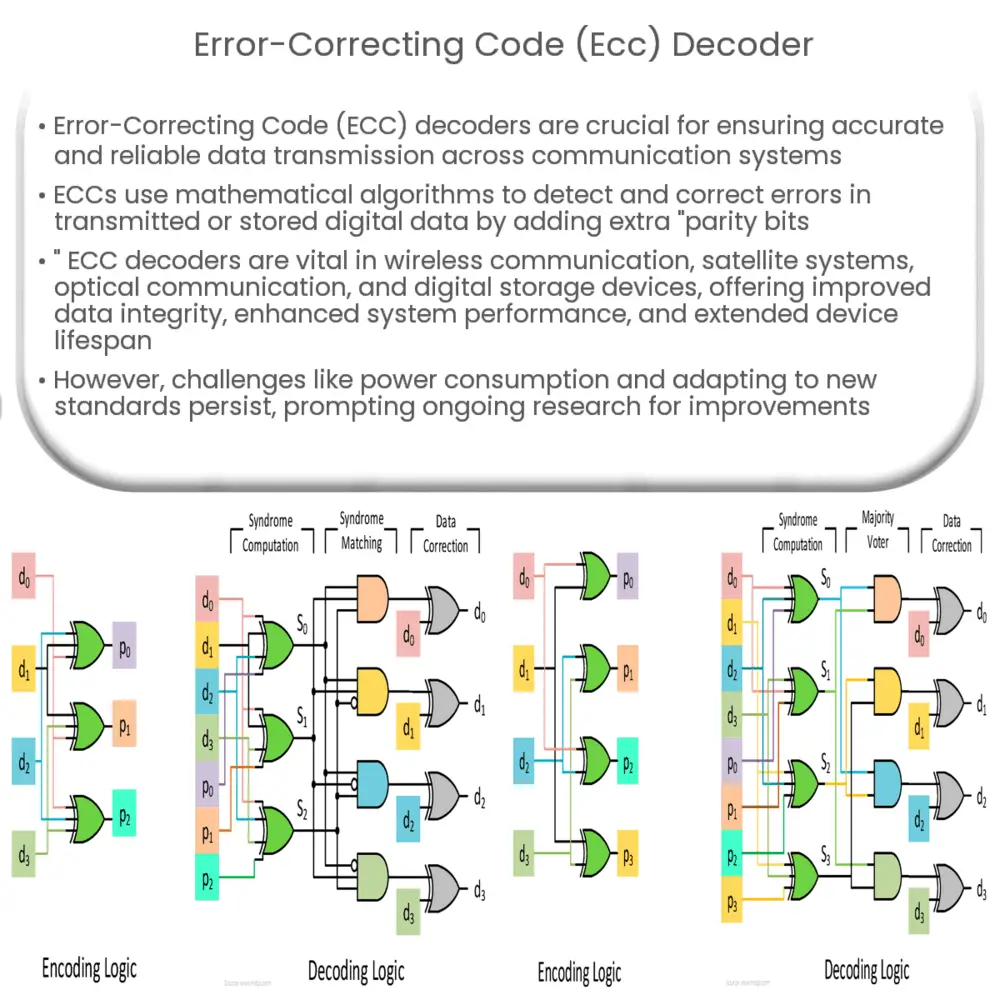ECC decoders ensure accurate data transmission and storage by detecting and correcting errors in communication systems and digital devices.

Error-Correcting Code (ECC) Decoder: An Essential Tool for Reliable Data Transmission
Introduction
Error-correcting code (ECC) decoders play a vital role in ensuring the accuracy and reliability of data transmission across various communication systems. They have become increasingly important as digital communication technology advances, and the demand for high-speed and dependable data transmission grows. In this article, we will discuss the basics of ECC decoders, their applications, and their significance in maintaining the integrity of transmitted data.
Understanding Error-Correcting Codes
Before delving into the specifics of ECC decoders, it is essential to understand the concept of error-correcting codes. These codes are mathematical algorithms designed to detect and correct errors that may occur during the transmission or storage of digital data. Errors can be caused by various factors, such as electrical noise, interference, or physical damage to the storage medium.
ECCs are based on the principle of redundancy, which involves adding extra bits of information to the original data. These additional bits, also known as parity bits, enable the detection and correction of errors within the received data. There are two main types of ECCs: block codes and convolutional codes. Block codes work on fixed-size blocks of data, while convolutional codes operate on data streams of varying lengths.
How ECC Decoders Work
ECC decoders are the counterpart of ECC encoders in a communication system. The encoder adds redundancy to the original data, while the decoder uses this redundancy to detect and correct any errors that may have occurred during transmission. The process of decoding involves two main steps: error detection and error correction.
Error detection is achieved by comparing the received data with the expected parity bits. If there is a mismatch, it indicates the presence of an error. Once an error is detected, the ECC decoder proceeds to correct it, typically using one of two approaches: hard-decision decoding or soft-decision decoding. Hard-decision decoding is based on binary values (0 or 1) and is relatively simple to implement, while soft-decision decoding considers the reliability of each received bit and is more computationally complex but offers better error-correction performance.
Applications of ECC Decoders
ECC decoders find widespread use in various communication systems and digital storage devices. Some of the most common applications include:
- Wireless communication systems, such as cellular networks and Wi-Fi, where signal interference and fading can cause data transmission errors.
- Satellite communication systems, which are prone to errors due to long distances, signal attenuation, and atmospheric disturbances.
- Optical communication systems, including fiber-optic networks, where signal dispersion and attenuation can lead to data corruption.
- Digital storage devices, such as hard drives and solid-state drives, where physical imperfections and wear can result in data loss or corruption.
Importance of ECC Decoders
With the ever-increasing demand for reliable and high-speed data transmission, the importance of ECC decoders cannot be overstated. They play a critical role in ensuring the accuracy and reliability of data transmitted across various communication systems and stored on digital devices. Some key benefits of using ECC decoders include:
- Improved data integrity: ECC decoders help detect and correct errors, ensuring the accurate and reliable transmission of data, which is crucial in applications such as banking, healthcare, and aviation, where data integrity is of utmost importance.
- Increased system performance: By correcting errors, ECC decoders reduce the need for retransmission of data, leading to improved overall system performance and reduced latency.
- Enhanced reliability: ECC decoders contribute to the overall reliability of communication systems and storage devices, reducing the likelihood of system failures and data loss.
- Extended device lifespan: In storage devices, the use of ECC decoders can mitigate the effects of wear and physical imperfections, potentially extending the lifespan of the device.
Challenges and Future Developments
Despite the numerous advantages of using ECC decoders, there are challenges that need to be addressed to further improve their performance and adapt to emerging technologies. Some of these challenges include:
- Complexity and power consumption: Soft-decision decoding, which offers superior error-correction performance, requires more computational power and energy, posing challenges in terms of hardware complexity and power consumption, especially in battery-powered devices.
- Adapting to new communication standards: As new communication standards and technologies emerge, ECC decoders must adapt to provide optimal performance and maintain compatibility with these systems.
- Scaling with increasing data rates: As data rates continue to increase, the need for efficient and robust ECC decoders becomes even more critical. Developing algorithms and hardware that can keep up with these demands is an ongoing challenge.
Researchers and engineers are continuously working to address these challenges and develop more advanced ECC decoding techniques. Innovations in areas such as low-density parity-check (LDPC) codes, polar codes, and machine learning-based decoding algorithms are expected to further enhance the performance and efficiency of ECC decoders in the future.
Conclusion
ECC decoders are an essential component in modern communication systems and digital storage devices, ensuring the accuracy and reliability of transmitted and stored data. By detecting and correcting errors, they contribute to improved system performance, enhanced reliability, and increased device lifespan. Despite the challenges associated with their implementation, ongoing research and technological advancements promise to make ECC decoders even more efficient and adaptable to the evolving needs of digital communication and storage systems.

